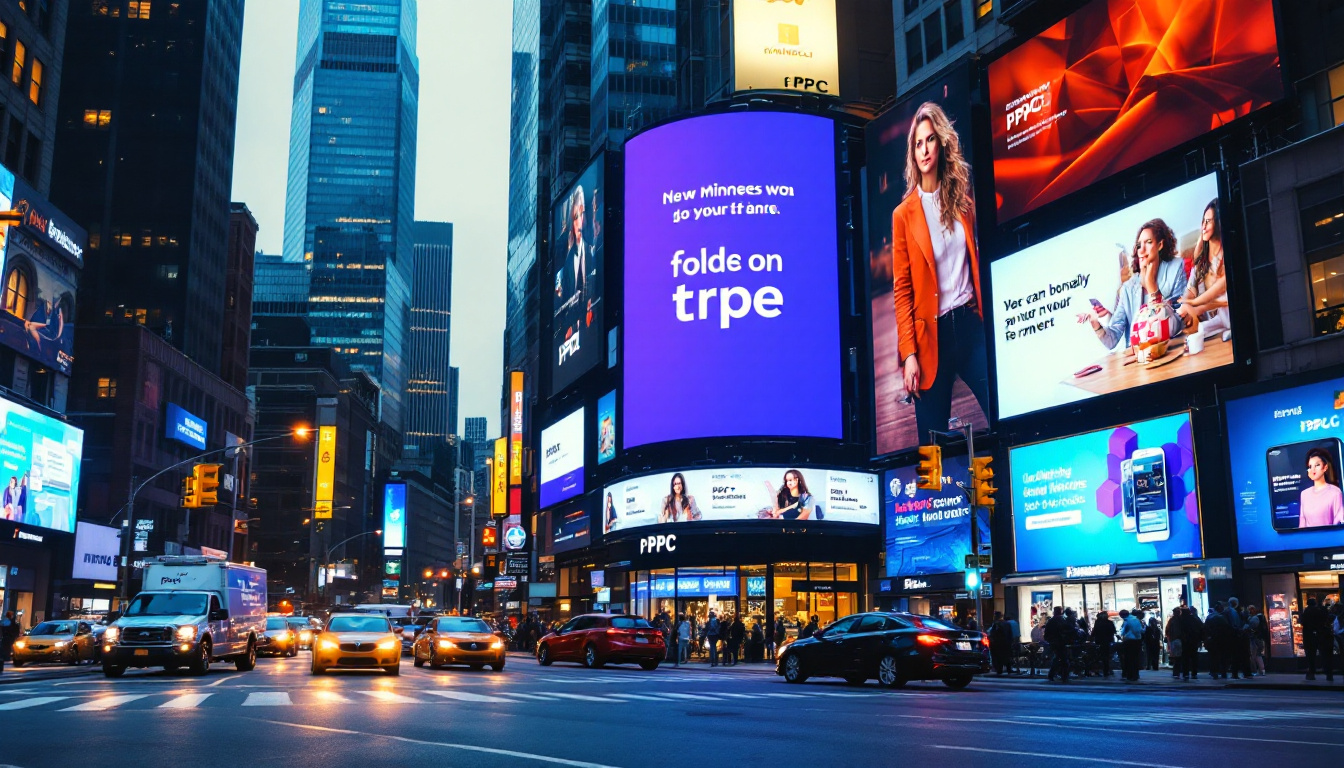The Beginner's Guide to PPC Advertising in Minneapolis, MN

Pay-per-click (PPC) advertising is an effective marketing strategy that has gained traction among businesses globally, especially in dynamic markets like Minneapolis, MN. This guide will provide an overview of what PPC is, why it's especially relevant for Minneapolis businesses, and how to craft an effective PPC campaign. Whether you're a small local business or a larger corporation, understanding PPC can significantly enhance your online visibility and customer engagement.
What is PPC and how does it work?
PPC, or pay-per-click advertising, is a digital marketing model where advertisers pay a fee each time their ad is clicked. It's essentially a way of buying visits to your site, rather than attempting to “earn” those visits organically through SEO. This model can lead to efficient targeting of customers, especially for businesses in urban areas like Minneapolis.

PPC ads appear on search engines, social media platforms, and other websites, making them a versatile choice for marketers. These ads are often strategically placed at the top of search engine results pages (SERPs), ensuring visibility. The primary platforms for PPC include Google Ads and Bing Ads, among others.
The mechanics of PPC involve researching relevant keywords, setting bids for those keywords, and creating ads that will attract user clicks. PPC campaigns can be meticulously tracked and adjusted, making them adaptable to changing market conditions. This real-time adaptability is what sets PPC apart from more traditional forms of advertising.
One of the key advantages of PPC is its ability to provide immediate results. Unlike SEO, which can take months to show significant outcomes, PPC campaigns can generate traffic almost instantly after launch. This immediacy is particularly beneficial for businesses looking to promote time-sensitive offers or new product launches. Additionally, PPC allows for precise targeting based on demographics, location, and even user behavior, enabling advertisers to reach their ideal audience effectively.
Moreover, PPC advertising offers comprehensive analytics and insights that empower marketers to refine their strategies continuously. Advertisers can monitor metrics such as click-through rates (CTR), conversion rates, and return on ad spend (ROAS). This data-driven approach not only helps in optimizing current campaigns but also aids in planning future marketing strategies. By analyzing which ads perform best, businesses can allocate their budgets more effectively, ensuring that every dollar spent on advertising yields the highest possible return.
Why PPC is ideal for businesses in Minneapolis, MN
Minneapolis is a vibrant city with a diverse range of industries, including healthcare, finance, and retail. This diversity creates a highly competitive marketplace, making it essential for businesses to differentiate themselves. PPC advertising offers a way to reach targeted audiences effectively.
One of the primary advantages of PPC in Minneapolis is the ability to target specific demographics and geographic locations. For example, a local coffee shop can create ads that specifically target residents in the downtown area, optimizing their advertising spend. Additionally, businesses can tailor their messaging to resonate with the unique culture and preferences of Minneapolis residents, whether it’s promoting local events or highlighting sustainable practices that align with the city's values.
- Immediate Results: Unlike organic marketing strategies that require time to build momentum, PPC can generate immediate engagement.
- Cost Control: Businesses can set budgets and max bids, ensuring they only spend what they can afford.
- Targeted Reach: With location targeting options, businesses can focus their ads on the Minneapolis area, reaching a local customer base effectively.
Moreover, the analytics available through PPC campaigns provide invaluable insight into consumer behavior in Minneapolis. This data can be leveraged to optimize future marketing strategies and improve service offerings. For instance, businesses can analyze which ads perform best during specific times of the year, allowing them to adjust their campaigns for seasonal promotions or local festivals that draw in crowds. Furthermore, understanding the keywords that resonate with Minneapolis consumers can enhance the relevance of ads, ensuring that they appear in front of the right audience at the right time.
Another significant benefit of PPC in Minneapolis is the opportunity for businesses to experiment with different ad formats and platforms. From search ads that appear on Google to visually appealing display ads on social media, companies can diversify their approach to capture the attention of potential customers. This flexibility is particularly beneficial in a city known for its artistic community and innovative spirit, as businesses can create engaging content that reflects the local culture. Additionally, retargeting strategies can be employed to re-engage users who have previously interacted with a business, further enhancing the chances of conversion and building brand loyalty.
How to set up a PPC campaign step-by-step
Setting up a PPC campaign may seem daunting, but following a structured approach can simplify the process. Here’s a step-by-step guide:

- Research Keywords: Within your industry, identify relevant keywords that potential customers might use to find your products or services.
- Create Your Ads: Develop compelling ad copy that highlights your unique value proposition. Ensure that your ads align with the keywords you've selected.
- Set Your Budget: Determine how much you are willing to spend on your PPC campaign. Establish daily and monthly budgets to help manage your expenditures.
- Choose Your Platforms: Decide where you want your ads to appear. Google Ads and social media platforms like Facebook and Instagram are popular options.
- Launch the Campaign: Once everything is in place, launch your campaign and closely monitor its performance.
After launching, it’s crucial to continually optimize your campaign. This includes adjusting bids on keywords, refining ad copy, and analyzing the performance data to ensure you are getting the best possible return on investment.
In addition to these steps, consider implementing A/B testing for your ads. This method allows you to compare different versions of your ads to see which performs better. By tweaking elements such as headlines, images, and calls to action, you can gain insights into what resonates most with your audience. A/B testing can significantly enhance your campaign's effectiveness, leading to higher click-through rates and conversions.
Moreover, tracking your campaign's performance through analytics tools is essential. Utilize platforms like Google Analytics to monitor traffic sources, user behavior, and conversion rates. This data can provide valuable insights into how well your ads are performing and where adjustments may be necessary. By regularly reviewing these metrics, you can make informed decisions that enhance your PPC strategy and drive more targeted traffic to your website.
Tips for choosing the right PPC keywords
Choosing the right keywords is a critical factor in the success of your PPC campaign. Here are some tips to help you select the most effective keywords:
- Use Long-Tail Keywords: These are often less competitive and can lead to higher conversion rates due to their specificity.
- Think Like Your Customers: Consider the terms that your target audience would use when searching for your products or services.
- Utilize Keyword Tools: Tools like Google's Keyword Planner can help you discover relevant keywords and their search volumes.
- Analyze Competitors: Check what keywords competitors are targeting and discover gaps you can exploit.
Ultimately, the goal is to find a balance between high-traffic keywords and those that are likely to convert. Regularly revisiting and updating your keyword strategy is essential as trends and consumer behavior change over time.
In addition to these strategies, consider the importance of negative keywords. Negative keywords prevent your ads from showing up for irrelevant searches, which can help improve your click-through rate and reduce wasted ad spend. For example, if you sell premium products, you might want to add "cheap" as a negative keyword to avoid attracting users who are not likely to convert. This can refine your audience and ensure that your ads are only displayed to those who are genuinely interested in what you have to offer.
Furthermore, keeping an eye on seasonal trends can also enhance your keyword selection. Certain keywords may perform better during specific times of the year, such as holidays or events. By analyzing past performance data, you can identify these trends and adjust your PPC campaigns accordingly. This proactive approach not only helps in maximizing your ad spend but also positions your business to capitalize on peak search times, ultimately driving more qualified traffic to your site.
How to track and measure success in PPC
Tracking and measuring the success of your PPC campaign is essential to understand its effectiveness and to make data-driven decisions. Important metrics to focus on include:
- Click-Through Rate (CTR): This metric indicates how often people click on your ad after seeing it. A higher CTR typically suggests that your ads are relevant to your audience.
- Conversion Rate: This determines how many of those clicks lead to the desired action, such as making a purchase or signing up for a newsletter.
- Cost Per Click (CPC): This metric helps you understand how much you’re paying for each click and can impact your overall budget.
- Return on Ad Spend (ROAS): This measures the efficacy of your PPC investments, evaluating how much revenue is generated for every dollar spent on advertising.
Using tools like Google Analytics in conjunction with your PPC platform enables comprehensive tracking of these metrics. By continuously monitoring your campaign performance, you can make necessary adjustments to optimize results. Regular reporting will help justify your PPC expenditures and highlight areas for improvement.
In summary, PPC advertising holds the potential for significant benefits, especially for businesses operating in competitive landscapes like Minneapolis, MN. By understanding its mechanics, diligently setting up campaigns, choosing the right keywords, and regularly measuring success, businesses can leverage PPC to boost their online presence and achieve their marketing objectives.

As a Google Ads expert, I bring proven expertise in optimizing advertising campaigns to maximize ROI.
I specialize in sharing advanced strategies and targeted tips to refine Google Ads campaign management.
Committed to staying ahead of the latest trends and algorithms, I ensure that my clients receive cutting-edge solutions.
My passion for digital marketing and my ability to interpret data for strategic insights enable me to offer high-level consulting that aims to exceed expectations.






















